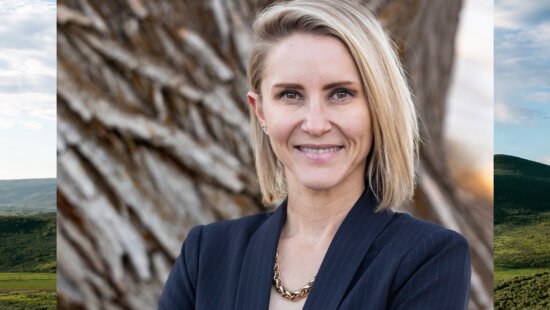Politics
Summit County residents, council slam district-based voting bill as “legislative power grab”

Megan McKenna, Chris Robinson and Tonja Hanson at the Summit County Council public hearing on April 23, 2025. Photo: SCC meeting screenshot
Citizens and county officials agree SB 356 is a blow to local control. There still may be time to fix it.
PARK CITY, Utah – A packed public meeting at the Summit County Council chambers turned fiery Wednesday night as residents from across the county condemned House Bill 356, calling it a “legislative power grab” that strips voters of local control and reshapes how county leaders are elected.
The recently passed state law forces counties like Summit—with fewer than 260,000 residents and a county manager form of government—to abandon at-large council elections in favor of district-based voting. Under the new system, voters will cast ballots for just one representative from their geographic district every four years, rather than electing all five council members.
While the idea of redistricting drew ire from many, it was the bill’s last-minute passage without public input that sparked the strongest backlash. HB 356 was passed in the final minutes of the Utah legislative session, with no public input, no debate, and no notice to local officials.
“The legislature passed this bill at 11:57 p.m., three minutes before midnight,” Council Chair Tonja Hanson said during the meeting. “That’s not how government that respects its citizens is supposed to operate.”
The change effectively removes local say in how elections are run and how community voices are heard. The new law mandates a districting commission composed of small-town mayors and just one representative for unincorporated areas—where 60 percent of Summit County residents live.
In addition to the public hearing Wednesday in Kimball Junction, Summit County Council heard the opinions of residents in Coalville last week. Hanson and other local leaders say they’re actively working to amend the law in the upcoming legislative interim session this May.
“We’ve lost a fundamental element of local control,” said Summit County Council Chair Tonja Hanson. “And we’re not done fighting to get it back.”
Council members plan to lobby state lawmakers to revise several key components of the bill.
Among the county’s top concerns: the makeup of the new redistricting commission and how current council members will be assigned to districts. As written, the commission includes the mayors of all Summit County municipalities and just one representative for unincorporated areas where most people in the county reside.
“We feel that number is not quite fair,” Hanson said. “We need more representation for unincorporated Summit County, whether that’s additional at-large appointees or including county council members directly.”
The council is also pushing to change the provision that would randomly assign current members to new districts via a lottery. “If I live in Coalville and Coalville becomes its own district, it only makes sense I represent it,” Hanson said. “Random assignments could completely disconnect elected officials from the communities they serve.”
Whether the county will succeed in influencing the law remains uncertain. But Wednesday night’s public meeting at the County Courthouse made one thing clear: many Summit County residents are discouraged by the bill, how it became law and how it strips away local control.
A room of frustration
During the public comment session, more than a dozen residents blasted HB 356 as a “legislative power grab” passed behind closed doors.
Snyderville resident Reed Galen called the bill a political maneuver designed to divide the county and empower outside interests. “This bill reeks of desperation and top-down control,” said Galen. “It’s meant to divide us and consolidate power in the hands of people who don’t live here and don’t share our values.”
Resident Meredith Reed questioned how a representative from South Jordan – who doesn’t represent any part of Summit County – proposed the last-minute bill that passed in the dead of night.
“If we must have districts, I would propose that we have three, with two at large seats that would increase all the voters having someone to answer to them,” Reed said.
Several speakers tied the legislation to frustration over the controversial Dakota Pacific project and the perception that state lawmakers are trying to sideline local authority in favor of powerful land-use interests.
“This isn’t about fairness,” said Reed. “This is about sidelining the voters and stacking the deck to serve developers, not communities.”
Others warned that district-based voting could lead to gerrymandering and a loss of accountability.
“Sixty percent of the county is unincorporated, yet we only get one seat at the table in the redistricting process,” Chris Campbell of Silver Creek Village said. “That’s not democracy—it’s manipulation.”
Supporters say it’s about equity
Not all in attendance were opposed. Julie Minchie of Hoytsville voiced support for HB 356, saying rural residents have long felt forgotten and she argued it would give rural residents more say and protect them from being drowned out by more populated areas.
“Representation matters,” Minchie said. “This ensures that people in all parts of the county finally get a voice.”
Pat O’Connell, a newer resident of Summit County living in Lower Deer Valley, said HB 356 addresses a real gap in representation. O’Connell argued that Summit County’s population has grown significantly since its current at-large voting system was established in 2006, and newer residents like him lack a direct voice on the council.
“This will result in better government and better representation,” he said.
Still, the majority of voices in the room decried the law as a blow to local democracy. Longtime resident Joanna Charnes summed it up bluntly: “This was a power play, plain and simple. And we’re the ones left to pick up the pieces.”
Concerns from former leaders
Former Summit County Council Chair Malena Stevens said there’s merit to the idea of districting but warned that the current plan risks leaving unincorporated residents with even less representation. She also suggested an alternative model with three districts and two at-large council seats.
“You’ll have one representative to go to,” she warned, adding that could lead to narrow, localized decision-making and political “horse trading.”
County Attorney Margaret Olson echoed those concerns. “We ought to be able to sit down and talk about ideas for how districts could be created that would really provide more equal representation,” she said.
Stevens also emphasized that under the current at-large system, there has consistently been East Side representation, and shifting to population-based districts might dilute that.
The Summit County Council will be required to hold a public hearing on the new district map once it is created—but under the law, they won’t be allowed to change it.
For now, Hanson said, the council’s focus is on securing revisions that restore fairness and keep community representation intact.
“We’re talking to our legislators right now,” she said. “And we’re not backing down.”


















